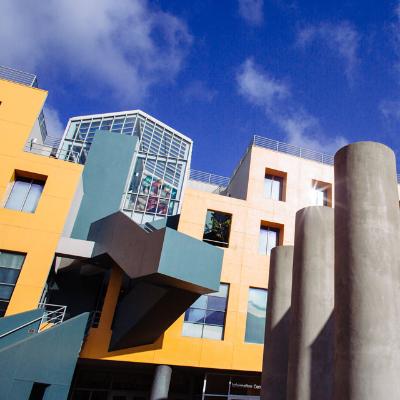
Loyola Law School’s Albany Street campus opened its doors in September 1964. The campus at that time consisted of one building, now the William M. Rains Library in the northwest corner of campus. It could accommodate 550 students, which at the time was a vast expansion of the law school’s Grand Avenue building that housed 396 students. And today, that single building has grown into a campus spanning 10 buildings and an entire city block in downtown Los Angeles.
The law school’s vibrant, downtown campus illustrates the forward-thinking approach of the law school’s early leaders, who were passionate about selecting a downtown location that provided room for an ever-evolving curriculum and teaching dynamic, as well as close proximity to the courts, downtown legal community, public interest law efforts and many other civic- and business-focused centers.
Real estate developer Fritz B. Burns was critical to the selection of the campus's location, who was introduced to LLS administrators by alumnus Joseph Rawlinson ’58. At the time, Rawlinson was working as Burns’s accountant. And the move to law school's current location would not have been possible without the expertise and guidance of the longtime law school supporter. Burns worked on behalf of the law school to negotiate the purchase of the location, as well as manage the planning process for the first campus building on the initial lots purchased on the corner of Ninth Street and Valencia. Not only was he generous with volunteering his time and knowledge, Burns was also very generous in his financial support of the institution.
It is best noted by former Dean Gerald T. McLaughlin in his book Loyola Law School: A Sense of Purpose and A Sense of Mission that, “If you wish to see a monument to Fritz B. Burns, you only have to look around the Loyola Law School campus. The Burns Building, Founders Hall, the Fritz B. Burns Chair in Real Property, and the Day and Evening Burns scholarship programs are all tributes to his generosity.” The spirit of Burns’ generosity is carried out today through the continued support of the Fritz B. Burns Foundation, which funds vital student scholarships.
And while students work in many legal environments throughout downtown Los Angeles gaining hands-on experience, they also receive cutting-edge practical-skills training on campus in several facilities focused on different areas of the law—from trial advocacy to transactional business law to mediation. The campus has mock courtrooms, mock boardrooms, clinics that allow for mediation observation and many other facilities that bring the law to life at Loyola. Dean Victor Gold emphasizes that Loyola has an “unparalleled set of facilities to allow our students to practice and develop the skills that they need to be effective lawyers in virtually any area of law practice.” Visit the magazine online at lls.edu/pubs to view Frank Gehry architecture video.
The law school’s award-winning Frank Gehry-designed campus is an academic village, with state-of-the-art facilities designed to encourage communication and social interaction. Inspired by the architecture and legal traditions of Rome and Athens, Gehry infused LLS with such features as Roman columns and other references to the origins of law. He also included a tree of learning, among other outdoor spaces, where faculty could engage with their students and teach the law, invoking the styles of such iconic educators as Socrates.
Today, the campus is infused with a deep respect for the foundations of law, but the campus is far from ancient. The dedication of the Girardi Advocacy Center, which houses the flagship Robinson Courtroom, strengthened Loyola’s position as a leader in advocacy skills. The newly renovated library offers the latest in information technologies. It houses more than 500,000 volumes and the recently added 24-hour study space.
The law school’s commitment to its mission of social justice and the public interest that began in the 1920s continues to thrive. The 20-plus live-client clinits of the Loyola Social Justice Law Center provide services locally and internationally. Their students efforts have added to the 1 million pro bono service hours contributed by LLS students since the school's founding.